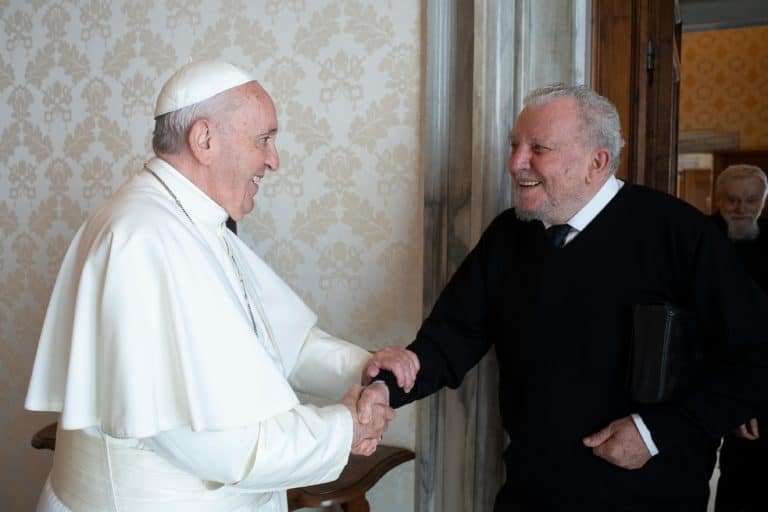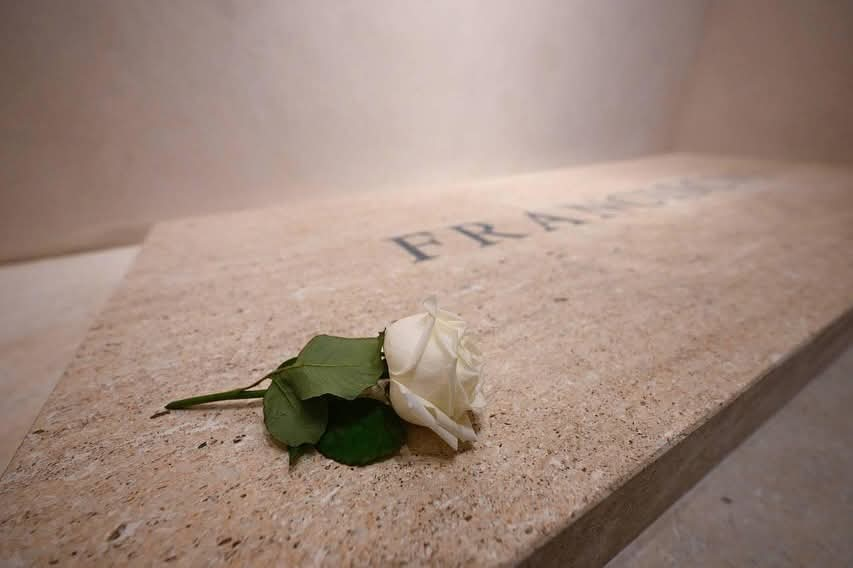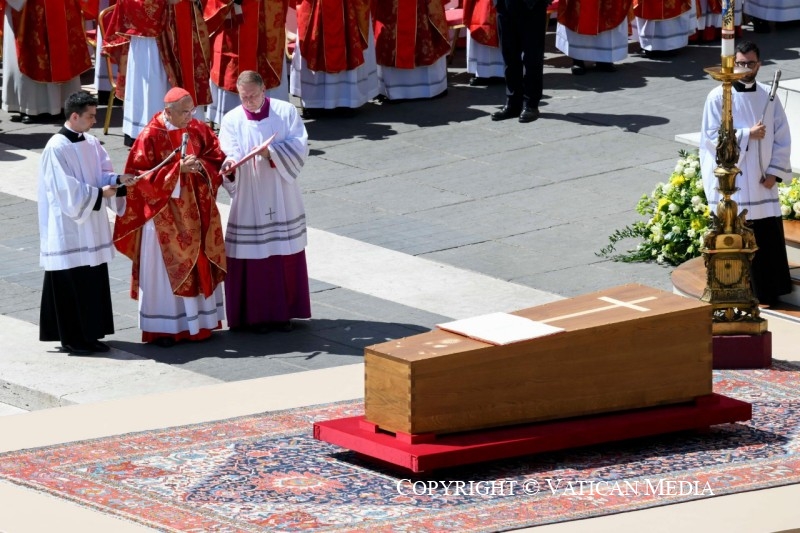Pope Meets with Neo-Catechumenal Founder
First Meeting after the Opening of the Process of Beatification of Carmen Hernández, the Movement’s Co-Founder

On Friday morning, September 3, 2021, Pope Francis received Kiko Argüello in audience, Founder of the Neo-Catechumenal Way, informed the Holy See Press Office and L’Osservatore Romano confirmed. As the meeting was private, the Vatican has not divulged the content of the conversation.
The Holy Father met with Argüello, 82, who was hospitalized last April with COVID-19. Discharged on the 7th of that month, he convalesced at home and asked for prayers for himself, “but especially for Father Mario“ Pezzi, the priest in charge of the Way’s international team. Father Pezzi, 79, was hospitalized with bilateral pneumonia. He was discharged on April 13 and convalesced at home.
Carmen Hernández’s Process of Beatification
The meeting of the Pontiff and the Way’s Founder took place after the Mass on Juy19, 2021, marking the 5th anniversary of the death of Carmen Hernández, Co-Founder of the Neo-Catechumenal Way, when the formal petition was made to open the Cause of Beatification of this exceptional woman, who marked the recent history of the Church. The Way’s Website states that, during the homily of the Mass, presided over by the Archbishop of Madrid, Cardinal Carlos Osoro, His Eminence said that Carmen “was able to proclaim Jesus Christ, opening horizons of joy and hope, showing, gifting and communicating God’s merciful love, showing the new life that appears with Christ.”
At the end of the Mass, Carlos Metola, Postulator of the Cause, handed the formal petition to Cardinal Osoro(the Supplex Libellus, once the 16,000 pages were collated that make up the 70 volumes of Carmen Hernández’s personal writings and catechesis, as well as other data collected since her death.).
During the Mass, Argüello’s note was read in which he said: “We believe that Carmen is with the Lord; she is already in the celebration. A truly exceptional woman, of enormous generosity, a most important woman for the Church! She always lived enamored of Christ. If one reads her diaries, all that she said: ‘Jesus I love you, I love You!’ On every page she wrote:’I love You, I love You! The only truth is to love Christ: ‘Love Christ and thousands will follow you,’ say the Desert Fathers. I thought they were following me but discovered that thousands of brothers are in the Way thanks to Carmen and the love she had for Christ.”
Opening of the Redemptoris Mater College in Asia
In one of the last meetings of the Way’s Founder with the Pope, in September of 2019, which he attended with the rest of the Evangelization team, Ascensión Romero and Father Mario Pezzi, Argüello took advantage of the meeting to thank the Pope for the opening of the Mater Redemptoris College in Macao, China, and entrusted to the Movement for the Evangelization of Asia.
The Press Department of the Neo-Catechumenal Way reported that the Founder handed the Pontiff a drawing of Saint Francis Xavier, which Argüello himself made for the occasion. Saint Francis Xavier, the great Apostle of Asia and Patron of the Missions, died at the doors of China. His incorrupt arm is venerated, in fact, in Macao.
Pope Francis thanked Argüello for the Way’s evangelizing mission. “I’m happy because you all carry out the most important thing of the Church, which is to evangelize, and you do so not by proselytizing but through witness.” He also stressed the importance of the presence of families on mission, who with their witness attract pagans and those estranged from the faith, and he accepted joyfully Argüello’s proposal of a new sending of families on mission, which will take place next year.
According to Fides Agency, in July of 2019, the Congregation for the Evangelization of Peoples instituted officially the Redemptoris Mater College for the Evangelization of Asia. The College was established by a Decree signed by Cardinal Fernando Filoni, Prefect of the Congregation for the Evangelization of Peoples, on June 29.
The Neo-Catechumenal Way
The Movement’s Website explains how at present the Neo-Catechumenal Way is at the service of Bishops and parish priests, as an itinerary to rediscover the Sacrament of Baptism and permanent formation in the faith. It is proposed to faithful who wish to revive in their life the richness of Christian initiation.
The Way, whose itinerary is lived in parishes, in small communities made up of people of all ages and social conditions, leads the faithful gradually to intimacy with Jesus Christ and transforms them into active subjects in the Church and credible witnesses of the Good News. It’s an instrument for the Christian initiation of adults preparing to receive Baptism.
Today it is present in 134 nations of five Continents, with 21,300 communities in 6,270 parishes, as well as 1,668 families on mission of which 216 are missio ad gentes in de-Christianized cities of five Continents, and with 125 Redemptoris Mater Diocesan Missionary Seminaries.
Kiko Argüello
Francisco José Gómez de Argüello Wirtz was born in León Spain on January 9, 1939. He studied Fine Arts at the San Fernando Academy of Madrid and, in 1959 was awarded the Extraordinary National Prize for Painting. After a profound existential crisis, he had a great conversion that led him to dedicate his life to Christ and the Church.
In 1960, together with sculptor Coomontes and glazier Muñoz de Pablos, he founded the “Guild 62” research and development group of Sacred Art. He held exhibitions in Madrid’s National Library and, appointed by the Ministry of Culture, in 1964 he represented Spain at the Universal Exhibition of Sacred Art in Royan, France. In 1965 he exhibited some of his works at the Nouvelles Images Gallery in Holland.
He went to live with the poor in 1964, in a slum in Palomeras Altas, outside the capital. He met Carmen Hernández there and both found a form of preaching, a kerygmatic-catechetical synthesis, which made possible the formation of a small Christian community. This community became a “seed” that, thanks to the then Archbishop of Madrid, Monsignor Morcillo, was planted in Madrid’s parishes and later in Rome and other nations.
Larissa I. López contributed to this article
Translation by Virginia M. Forrester
Related

Cardinal Parolin at the Novendalia Mass: “Mercy leads us to the heart of faith”
Exaudi Staff
27 April, 2025
8 min

Pope Francis’ Tomb in Santa Maria Maggiore
Exaudi Staff
27 April, 2025
1 min

Mercy and the joy of the Gospel are two key concepts of Pope Francis
Exaudi Staff
26 April, 2025
9 min

Thousands of faithful bid farewell to Pope Francis in St. Peter’s Square
Exaudi Staff
26 April, 2025
2 min
 (EN)
(EN)
 (ES)
(ES)
 (IT)
(IT)

